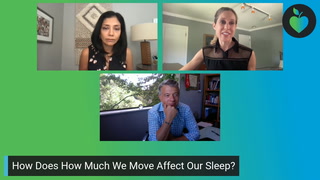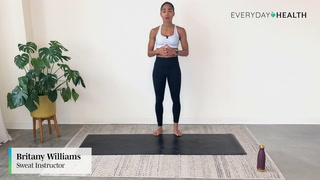
Shutterstock
When it comes to working out, you know that what you do in the gym is important. But what you do outside the gym — what you eat, what you drink, and especially how you sleep, is just as crucial. In fact, you must sleep in order for exercise to actually work.
“We exercise for a purpose: for cardiovascular health, to increase lean muscle mass, to improve endurance, and more. All of these ‘goals’ require sleep,” says W. Christopher Winter, MD, the president of Charlottesville Neurology and Sleep Medicine and the author of The Sleep Solution: Why Your Sleep Is Broken and How to Fix It.
Without sleep, exercise does not deliver those benefits, Dr. Winter explains. “If you don’t sleep, you undermine your body.”
RELATED: What Happens to Your Mind and Body When You Don’t Sleep
Sleep gives your body time to recover, conserve energy, and repair and build up the muscles worked during exercise. When we get enough good quality sleep, the body produces growth hormone. During childhood and adolescence, growth hormone makes us grow — as the name implies, Winter says. “And when we are older, it helps us build lean muscle and helps our body repair when we have torn ourselves up during a hard workout,” he adds. “Growth hormone is essential for athletic recovery.”
The problem is that Americans have a major issue when it comes to sleep: More than 30 percent of us are sleep-deprived, which means we’re not getting the recommended seven to eight hours a night required for adults. (1,2) And that means more than 100 million people in the U.S. are sabotaging their own fitness goals, too.
Can Moving More During the Day Improve Sleep at Night?

Regular Exercise Can Absolutely Help You Sleep
Can exercise help you sleep? Absolutely. And if you’ve never experienced that immediate sleep-inducing exhaustion one might experience after a day of hiking or a grueling boot camp class, there’s a ton of scientific research to back up this claim, too.
In one study, individuals with a self-reported sleep time of less than 6.5 hours completed moderate-intensity workouts (think walking, riding a stationary bicycle, or running or walking on a treadmill) four times a week for six weeks. (3) At the end of the experiment, they reported getting an extra 75 minutes of sleep per night — more than any drug has helped deliver, according to the study authors.
Exercise actually has a chemical effect on the brain. “Physical activity creates more adenosine in the brain, and adenosine makes us feel sleepy,” says Winter. (Fun fact: Adenosine is the chemical that caffeine blocks to make you feel more alert.) “The harder we work out, the more driven we are by this chemical to sleep.”
Britany Williams X Everyday Health: 5-Minute Express Full Body Barre Class

Working out also helps you maintain your circadian rhythm (that is, your body’s internal clock), Winter says. “Exercise helps your body understand the schedule it’s on; and morning exercise primes your body to sleep better at night.”
But what about late-day exercise? While it is possible that exercising at night will keep you awake longer, science says it’s a matter of choosing the right type of workout and finding the right workout schedule for you.
People who reported greater exertion before bed were actually more efficient sleepers, according to research; they also fell asleep faster, slept deeper, and woke up less during the night. (4) Another study found that moderate-intensity workouts before bed helped soothe presleep anxiety. (5)
That said, you’re probably better off sticking to low-intensity workouts like yoga, pilates, or barre, if you plan to sweat close to bedtime. Research found that high-intensity exercise has been shown to delay sleep onset, probably because of an increased heart rate post-gym time. (6)
RELATED: How to Quiet a Racing Mind and Fall Back Asleep Tonight
Winter recommends finding out what works for you. Everyone is different when it comes to how stimulating any one particular workout might be. If you have trouble falling asleep, getting your heart rate up too close to bedtime may be contributing to that, but for others, breaking a sweat at the end of the day may not affect sleep.
Does Getting Better Sleep Help My Workout?
Again, the short answer is yes. The better rested you are, the better your mind and body function — and that includes at the gym. Adequate sleep has been shown to help motivate people to stick to their exercise plans and work out the next day, according to a study. (7) The more sleep time individuals in the study got, the more likely they were to complete their exercise regimen.
“Getting enough sleep can not only give you more drive and strength to maximize your workout, but its effects on concentration, mood, and focus can make you more efficient and better prepared for that workout,” explains Winter.
RELATED: How Much Exercise Is Enough?
On the flip side, not getting enough sleep can actually make exercise feel harder. (8) Sleep deprivation won’t affect your cardiovascular and respiratory responses to exercise, aerobic and anaerobic performance capability, muscle strength, or electromechanical responses. That means biomechanically there’s no reason sleep will lessen your physical capabilities. But you will fatigue faster on less sleep, making it feel tougher to work out to your maximum capacity.
In fact, even after just one night of not sleeping, endurance performance on a treadmill decreases — likely because it feels so much tougher. (9)
That’s not to say that suddenly getting the requisite seven to eight hours of sleep a night will turn you into a speed demon or a sports superstar. Extra sleep won’t necessarily make you faster, stronger, or improve your times or performance. Rather, sleep loss has been linked to physiological responses — like autonomic nervous system imbalances, which are similar to overtraining symptoms like sore muscles and a higher risk of injuries — that can inhibit your performance. (10)
Better to Fit in That Early Morning Workout or Log an Extra Hour of Sleep?
Getting enough sleep and getting regular exercise are both important, so how do you decide which one takes priority? You really shouldn’t put yourself in that position, because you absolutely need both.
RELATED: Why Exercise Is So Important for Your Health
But if it’s not possible to find that perfect balance all the time, “I would say sleep is always the priority, unless your sleep is almost always sound in quality and quantity,” says Winter.
So if you got seven to eight hours of sleep the night before, get up and hit the gym! But if you’ve been clocking less than six hours most nights that week, you probably want to savor that extra hour of sleep. If you skip it, chances are you’ll log a subpar workout, anyway.
And if you were up all night the night before, definitely choose sleep, Winter says. After an all-nighter (or just a few hours of shut-eye), your body needs the rest more than ever.
The bottom line: If you’re not getting the recommended seven to eight hours of sleep per night, you need to rethink your schedule so you can make sure you do — and then you have to figure out how to fit in your regular workouts without sacrificing that sleep. You can’t have one without the other; both are absolutely essential to you being able to operate at 100 percent — not just in the gym, but in your everyday life, too.

Sign up for our Healthy Living Newsletter!
By subscribing you agree to the Terms of Use and Privacy Policy.
Editorial Sources and Fact-Checking
- Hirshkowitz M, Whiton K, Albert SM, et al. National Sleep Foundation’s Sleep Time Duration Recommendations: Methodology and Results Summary. Sleep Health. March 2015.
- 1 in 3 Adults Don’t Get Enough Sleep. Centers for Disease Control and Prevention. February 18, 2016.
- Reid KJ, Baron KG, Lu B, et al. Aerobic Exercise Improves Self-Reported Sleep and Quality of Life in Older Adults With Insomnia. Sleep Medicine. October 2010.
- Brand S, Kalak N, Gerber M, et al. High Self-Perceived Exercise Exertion Before Bedtime Is Associated With Greater Objectively Assessed Sleep Efficiency. Sleep Medicine. September 2014.
- Passos GS, Poyares D, Santana MG, et al. Effect of Acute Physical Exercise on Patients With Chronic Primary Insomnia. Journal of Clinical Sleep Medicine. June 15, 2010.
- Oda S, Shirakawa K. Sleep Onset Is Disrupted Following Pre-Sleep Exercise That Causes Large Physiological Excitement at Bedtime. European Journal of Applied Physiology. September 2014.
- Baron KG, Reid KJ, Zee PC. Exercise to Improve Sleep in Insomnia: Exploration of the Bidirectional Effects. Journal of Clinical Sleep Medicine. August 15, 2013.
- VanHelder T, Radomski MW. Sleep Deprivation and the Effect on Exercise Performance. Sports Medicine. April 1989.
- Oliver SJ, Costa RJS, Laing SJ, et al. One Night of Sleep Deprivation Decreases Treadmill Endurance Performance. European Journal of Applied Physiology. September 2009.
- Fullagar HH, Skorski S, Duffield R, et al. Sleep and Athletic Performance: The Effects of Sleep Loss on Exercise Performance, and Physiological and Cognitive Responses to Exercise. Sports Medicine. February 2015.
The Latest in Fitness
6 Serious Health Risks of Steroid Drug Use to Boost Athletic Ability
Taking these drugs for performance and muscle enhancement is illegal. Here’s what doctors want you to know about the dangerous side effects.
By Moira Lawler
6 Things You Need to Know About Exercising on the Keto Diet
How is going on the keto diet going to affect your exercise routine? For some workouts, performance may take a hit. But if you’re fueling the right way...
By Michael Dolan
8 Ways to Sit Less and Move More Each Day
Hate to exercise? Just adding in easy activities — as simple as standing up and stretching — can make a significant difference to your weight and well...
By Wyatt Myers
How to Fit in More Steps Every Day
How many steps do you take each day? Higher daily step counts tend to be linked to a lot of health benefits, including overall mortality (meaning, yes...
By Elizabeth Millard
A Good Sports Bra Can Boost Your Running in a Surprising Way
A supportive sports bra can boost your workouts not just by minimizing breast bounce but also by altering how you bend your knees, a study suggests.
By Lisa Rapaport
Running: What It Is, Health Benefits, How to Get Started, and How to Get Better
Running is a workout that can boost your heart health, bone health, mood, energy, and more. Here’s how to get started, how to get better, and how to avoid...
By Elizabeth Millard
8 Ways Strength Training Boosts Your Health and Fitness
Here’s why strength training is so good for your health and fitness, from stronger bones to boosting weight loss to helping you manage conditions like...
By Chris Iliades, MD
Strength Training: Health Benefits, How to Get Started, and How to Get Better
What counts as a good strength workout? What are the different types of resistance workouts? And why is this type of exercise so good for you? Find out...
By Lauren Bedosky
Is Strength Training Good for Weight Loss?
Resistance exercise may not burn as many calories as aerobic, but it can support weight loss in other ways. Here’s how.
By Lauren Bedosky
Why Being Fit Helps You Manage Chronic Diseases
Maintaining fitness can play a big role in helping manage symptoms of and slow the progress of chronic conditions like rheumatoid arthritis, type 2 diabetes...
By Brian Mastroianni

